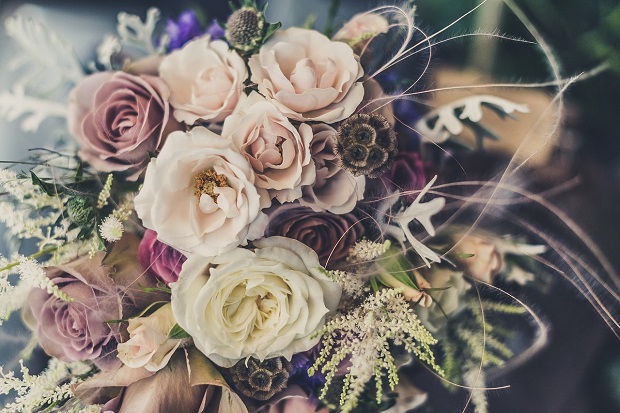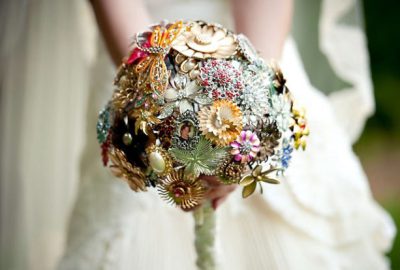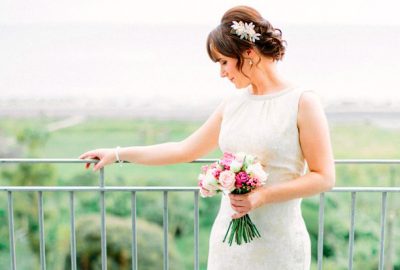There really isn’t a flower or a combination of flowers you can’t put in your wedding bouquet nowadays. But that got us thinking: how many traditional beliefs go into assembling one? While looking at photos for inspo, did you ever think about the meaning of your wedding bouquet? Or is it simply another wedding superstition that modern brides are simply too savvy for?
Either way, in case you were interested (or for a giggle), here are flowers and how they add meaning to your wedding bouquet. Enjoy!
Anemone
Meaning: Expectation
Best For: Bouquets and arrangements
Scent: None
In Season: fall (Japanese varieties) to spring (Wood or De Caen varieties)
Price Range: Moderate
Floral Fact: Anemones bloom in either single or double blossoms.
Baby’s Breath
Meaning: Innocence
Best For: Filler in bouquets, corsages, and boutonnieres
Scent: None
In Season: Year-round
Price Range: Inexpensive
Calla Lily
Meaning: Magnificent beauty
Best For: Bouquets and arrangements
Scent: Lightly fragrant
In Season: Spring and summer
Price Range: Expensive
Carnation
Meaning: Pink represents boldness, red symbolizes love, and white indicates talent. Some other colors have negative connotations (see bottom).
Best For: Bouquets, boutonnieres, and arrangements
Scent: Very light fragrance or none at all, depending on variety
In Season: Year-round
Price Range: Inexpensive
Chrysanthemum (or mum)
Meaning: Wealth, abundance, truth
Best For: Bouquets and arrangements
Scent: None
In Season: Year-round
Price Range: Inexpensive
Floral Fact: Mums come in several varieties, which determine their size and color. The name literally means “golden flower.” Beware though, it’s a funeral flower in some countries.
Daffodil
Meaning: Regard
Best For: Garden settings, in pots
Scent: None
In Season: Spring
Price Range: Inexpensive (in season)
Daisy
Meaning: Share your feelings
Best For: Bouquets
Scent: None
In Season: Year-round
Price Range: Inexpensive (in season)
Delphinium
Meaning: Swiftness, lightness
Best For: Arrangements
Scent: Lightly fragrant
In Season: Summer
Price Range: Moderate
Freesia
Meaning: Innocence
Best For: Bouquets
Scent: Very fragrant. In fact, if you’re going to use them for boutonnieres or other flowers that will be around for the whole day, best check with the wearers that they don’t have any scent allergies.
In Season: Spring and summer
Price Range: Inexpensive (in season)
Gardenia
Meaning: Purity, joy
Best For: Bouquets and boutonnieres
Scent: Very fragrant
In Season: Year-round
Price Range: Expensive
Hydrangea
Meaning: Understanding
Best For: Bouquets and arrangements
Scent: None
In Season: Spring and fall
Price Range: Expensive
Iris
Meaning: A message of faith, wisdom
Best For: In arrangements or potted
Scent: Fragrant
In Season: Spring
Price Range: Moderate to expensive, depending on variety
Floral Fact: Irises come in several sizes; they are usually blue or white, but you may find exotic varieties (including purple ones).
Lilac
Meaning: Love’s first emotions
Best For: Filler in arrangements or as part of bouquets, depending on variety
Scent: Very fragrant
In Season: Local lilacs are available in the spring; imported French lilacs are available year-round
Price Range: Moderate to expensive
Floral Fact: The local lilac is grown like a bush, and is used as filler because of its greenery. The French lilac is more flower-like and can be used as such in bouquets and arrangements.
Lily
Meaning: Majesty, truth, honour
Best For: Bouquets and arrangements
Scent: Fragrant
In Season: Summer, but often imported during other seasons
Price Range: Moderate to expensive
Lily of the Valley
Meaning: Happiness
Best For: Bouquets, in combination with other flowers
Scent: Fragrant
In Season: Spring and summer
Price Range: Expensive
Floral Fact: These small, fragile, bell-shaped flowers are considered traditional marriage flowers.
Magnolia
Meaning: Love of nature
Best For: Arrangements
Scent: Depends on variety
In Season: Spring and summer
Price Range: Expensive
Floral Fact: Magnolias are great for Southern-style weddings, as most magnolia trees grow in the South.
Orchid
Meaning: Love, beauty
Best For: Bouquets, corsages, and boutonnieres
Scent: None
In Season: Year-round — almost always imported
Price Range: Expensive
Peony
Meaning: Bashfulness, and the American spirit of ambition and determination
Best For: Arrangements
Scent: Lightly fragrant
In Season: Late spring
Price Range: Expensive
Rose
Meaning: Love, joy, beauty
Best For: Bouquets, corsages, boutonnieres, and arrangements
Scent: Lightly fragrant to very fragrant, depending on variety
In Season: Year-round
Price Range: Moderate to expensive
Floral Fact: Roses are the most popular wedding flowers.
Stephanotis
Meaning: Marital happiness
Best For: Bouquets and arrangements
Scent: Very fragrant
In Season: Year-round
Price Range: Moderate
Floral Fact: These trumpet-shape blossoms are traditional bridal flowers, no doubt due to their meaning.
Stock
Meaning: Lasting beauty
Best For: Filler in arrangements
Scent: Very fragrant
In Season: Year-round
Price Range: Inexpensive
Floral Fact: Stock can be found in many colors to complement and fill out arrangements.
Sunflower
Meaning: Short-stemmed sunflowers mean adoration; long-stemmed sunflowers symbolize haughtiness
Best For: Carrying a single stem down the aisle; potted arrangements
Scent: None
In Season: Autumn
Price Range: Inexpensive to moderate in season
Sweet Pea
Meaning: Pleasure
Best For: Garden setting, in vases
Scent: Fragrant
In Season: Late spring and early summer
Price Range: Moderate
Tulip
Meaning: Love, passion
Best For: Arrangements and bouquets
Scent: None
In Season: Late spring
Price Range: Expensive
Floral Fact: These sweet and stately flowers can be found in a myriad of colors, but they are very fragile.
When the meaning of your wedding bouquet goes the other way…
Unfortunately, some flowers carry bad connotations, so you may consider avoiding them (only if you are superstitious about these things, of course):
- Christmas Rose: Scandal
- Fig: Idleness
- Foxglove: Insincerity
- Larkspur: Infidelity
- Lavender: Distrust
- Marigold: Grief
- Mulberry: I shall not survive you
- Raspberry: Remorse
- Red Carnation: Alas for my poor heart
- Red Poppy: Consolation
- Rhododendron: Danger
- Striped Carnation: Refusal
- White Poppy: Sleep
- Yellow Carnation: Disdain
- Yellow Chrysanthemum: Slighted Love
- Yellow Lily: Falsehood
- Yellow Rose: Jealousy
Finally, the meaning of your wedding bouquet is what you give it. Consequently, make sure to use your favourite flowers! It matters most that you love it, and maybe even want to preserve it. The meaning of your wedding bouquet should be entirely personal, just like your whole wedding day.




